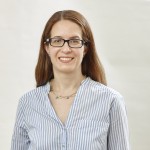Dr. Elena Rotarou will be the main researcher of the DISCA nucleus – Disability and Citizenship, an initiative that seeks to inform public policies about the barriers that prevent people with disabilities from fully exercising citizenship.
The WHO estimates that One billion people live with disabilities, that is, about 15% of the world’s population. In general, they experience worse health care and education, higher rates of poverty, and lower rates of labor participation. In Chile, 16.7% of the population has a disability, negatively impacting the level of income, labor participation, education and well-being.
“Although one in five adults in Chile has some type of disability, research on the subject is scarce,” says Dr. Elena Rotarou, a researcher at the Faculty of Medicine and Science of the San Sebastian University. In that context, The National Research and Development Agency (ANID) recently awarded a new Millennium Nucleus focused on this problem,  Directed by Dr. Florencia Herrera from Universidad Diego Portales -who is a visually impaired person- and with Dr. Rotarou as Principal Investigator.
Directed by Dr. Florencia Herrera from Universidad Diego Portales -who is a visually impaired person- and with Dr. Rotarou as Principal Investigator.
Faced with the scant reliable information that exists in the country about the situation of people with disabilities, the DISCA Millennium Nucleus – Disability and Citizenship, “will allow us to expand our knowledge, and move towards protecting the rights and improving the well-being of people with disabilities”explains the USS academic.
“As principal investigator of this project, I would like to close the knowledge gap, help in the implementation of inclusive public policies, and establish DISCA as the first center of excellence in Latin America for disability research.”
Multi and transdisciplinary approach
The barriers that prevent the full participation of people with disabilities in society affect their experience of being equal citizens. A) Yes, the DISCA project proposes a multi and transdisciplinary approach to the processes and mechanisms through which people with disabilities exercise citizenshipcritically examining how they build and “negotiate” it, particularly in the areas of political participation, sexuality and reproduction, and access to health.
Added to this is a fourth line of work focused on the use of inclusive and participatory research methodologies. The group of researchers -all of them pioneers in disability research in Chile- will use mixed, quantitative and qualitative methodologies, integrating the anthropology, law, health, economics, sociology and psychologyin conjunction with the transdisciplinary field of disability studies.
Dr. Elena Rotarou, in particular, has focused her research on health systems, public policies, and access to health services for people with disabilities in the Chilean and international context.
Impact on public policies
The DISCA Millennium Nucleus seeks open a pioneering space that promotes and articulates disability studies in Chile and Latin America, working together with people with disabilities, as well as with the public sector, the private sector and NGOs. In this way, it will address the diverse nature of the barriers experienced by people with disabilities, be they institutional, physical or economic, among others.
Its ultimate purpose is generate knowledge to inform public policies and improve the lives of people with disabilities in Chile, extending the scope of its work to other Latin American countries, as well as internationally.





![[Img #74664]](https://thelatestnews.world/wp-content/uploads/2024/12/James-Watson-The-controversial-genius-behind-the-double-helix-150x150.jpg)







![[Img #74664]](https://thelatestnews.world/wp-content/uploads/2024/12/James-Watson-The-controversial-genius-behind-the-double-helix-300x200.jpg)

